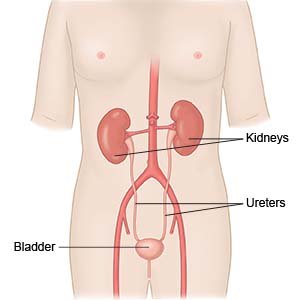Urinary Tract Infection in Older Adults
Medically reviewed by Drugs.com. Last updated on Aug 4, 2025.
What is a urinary tract infection (UTI)?
A UTI is caused by bacteria that get inside your urinary tract. Your urinary tract includes your kidneys, ureters, bladder, and urethra. A UTI is more common in your lower urinary tract, which includes your bladder and urethra.
 |
What increases my risk for a UTI?
- A UTI within the last 3 months
- Menopause in women
- Enlarged prostate in men
- Medicines that affect urination
- Urinary incontinence (you cannot control your bladder)
- Sexual intercourse
- Medical conditions, such as diabetes or obesity
- Urinary tract problems, such as a narrowing, kidney stones, or inability to empty your bladder completely
What are the signs and symptoms of a UTI?
- Fever and chills
- Pain or burning when you urinate
- Urine that smells bad or looks cloudy, or blood in your urine
- Urinating more often or waking from sleep to urinate
- Sudden, strong need to urinate
- Pain or pressure in your lower abdomen
- Leaking urine
- Confusion or agitation
- Fatigue, shakiness, and weakness
How is a UTI diagnosed?
Your healthcare provider will ask about your symptoms. He or she may also examine you. You may need any of the following:
- A urinalysis will give information about your urinary tract and overall health.
- A urine culture may show the type of germ causing the infection. You may need this test again if you continue to have signs and symptoms after a UTI is treated.
Related medications
How is a UTI treated?
Medicines treat the bacterial infection or decrease pain and burning when you urinate. You may also need medicines to decrease the urge to urinate often. If you have UTIs often (called recurrent UTIs), you may be given antibiotics to take regularly. You will be given directions for when and how to use antibiotics. The goal is to prevent UTIs but not cause antibiotic resistance by using antibiotics too often.
Treatment options
The following list of medications are related to or used in the treatment of this condition.
How can I manage my symptoms?
- Drink liquids as directed. Liquids can help flush bacteria from your urinary tract. Ask how much liquid to drink each day and which liquids are best for you. You may need to drink more liquids than usual to help flush out the bacteria. Do not drink alcohol, caffeine, and citrus juices. These can irritate your bladder and increase your symptoms.
- Apply heat on your abdomen for 20 to 30 minutes every 2 hours for as many days as directed. Heat helps decrease discomfort and pressure in your bladder.
How can I help prevent a UTI?
- Urinate when you feel the urge. Do not hold your urine. Bacteria can grow if urine stays in the bladder too long. It may be helpful to urinate at least every 3 to 4 hours.
- Urinate after you have sex. This will help flush away bacteria that can enter your urinary tract during sex.
- Wear cotton underwear and clothes that are loose. Tight pants and nylon underwear can trap moisture and cause bacteria to grow.
- Drink cranberry juice or take cranberry supplements. These may help prevent UTIs. Your healthcare provider can recommend the right juice or supplement for you.
- Women should wipe front to back after urinating or having a bowel movement. This may prevent germs from getting into the urinary tract. Do not douche or use feminine deodorants. These can change the chemical balance in your vagina. You may also be given vaginal estrogen medicine. This medicine helps prevent recurrent UTIs in women who have gone through menopause or are in peri-menopause.
When should I seek immediate care?
- You become confused or agitated.
- You fall down.
- You are urinating very little or not at all.
- You are vomiting.
- You have a high fever with shaking chills.
- You have side or back pain that gets worse.
When should I call my doctor?
- You have a fever.
- You are a woman and you have increased white or yellow discharge from your vagina.
- You do not feel better after 2 days of taking antibiotics.
- You have questions or concerns about your condition or care.
Care Agreement
You have the right to help plan your care. Learn about your health condition and how it may be treated. Discuss treatment options with your healthcare providers to decide what care you want to receive. You always have the right to refuse treatment. The above information is an educational aid only. It is not intended as medical advice for individual conditions or treatments. Talk to your doctor, nurse or pharmacist before following any medical regimen to see if it is safe and effective for you.© Copyright Merative 2025 Information is for End User's use only and may not be sold, redistributed or otherwise used for commercial purposes.
Learn more about Urinary Tract Infection
- Antibiotic Resistance: The Top 10 List
- Antibiotics 101: Common Names, Types & Their Uses
- Antibiotics For UTI Treatment - What Are My Options?
- Antibiotics and Birth Control Pill Interactions
- Anticholinergic Drugs to Avoid in the Elderly
- Can You Drink Alcohol with Antibiotics?
- Common Side Effects from Antibiotics, and Allergies and Reactions
- Why Don’t Antibiotics Kill Viruses?
Treatment options
Medicine.com guides (external)
Further information
Always consult your healthcare provider to ensure the information displayed on this page applies to your personal circumstances.
